A reputable jeweller is reportedly spending several hours each week on an unwelcome task: addressing customer complaints. The significant time drain, however, isn’t due to their own clientele but rather a case of mistaken identity, as unhappy patrons of a similarly named, yet thoroughly unscrupulous, business are mistakenly contacting their establishment.
Hove-based entrepreneur Stevie Holmes is facing an unusual predicament: her legitimate company, Scarlett Jewellery, is being repeatedly confused with a similarly named website. This other platform, ‘Scarlett Jewels,’ has been identified by an expert as being populated with AI-generated images, leading to a significant case of mistaken identity for Holmes and her reputable brand.
Ms. Holmes has revealed a troubling pattern among customers of the Scarlett Jewels website, who reportedly received either substandard products or, in some cases, no items at all after placing orders.
Here are several ways to paraphrase “Scarlett Jewels was contacted for comment,” maintaining a clear, journalistic tone:
**Direct & Neutral:**
* Requests for comment were extended to Scarlett Jewels.
* Scarlett Jewels was asked to provide a statement.
* Comment was sought from Scarlett Jewels regarding the matter.
**Slightly More Active/Detailed:**
* Scarlett Jewels was approached for an official statement.
* Our team reached out to Scarlett Jewels for their perspective.
* Attempts were made to secure a response from Scarlett Jewels.
**Emphasizing Outcome (if known):**
* Scarlett Jewels has been contacted for comment but has yet to respond.
* Scarlett Jewels was contacted for comment; a response is pending.

Since July, Ms. Holmes has been grappling with a daily onslaught of communications—spanning phone calls, web chats, and emails—from Scarlett Jewels customers who uniformly claim their orders were never delivered.
Here are a few options, maintaining a clear, journalistic tone:
**Option 1 (Focus on the time commitment):**
She revealed that she dedicates a minimum of one hour each day solely to responding.
**Option 2 (Focus on the activity as a daily demand):**
Addressing various communications, she explained, consumes at least an hour of her time every single day.
**Option 3 (More direct and formal):**
The task of managing her correspondence, she underscored, requires upwards of an hour daily.
Ms. Holmes told the BBC that without explicitly differentiating her operation from Scarlett Jewellery, her business would likely be subjected to unwarranted complaints circulating on social media.
She underscored the critical importance of protecting her legitimate business’s reputation from being mistakenly associated with the disreputable company.

A review of the Scarlett Jewels website’s fine print reveals the online platform is operated by Denimtex Limited, a company officially registered with an address in Hong Kong.
However, the website purports to be operated by an elderly woman who reportedly unveiled “one last collection” as she prepared to retire from her workshop.

Ana Canhoto, Professor of digital business management at the University of Sussex, noted the increasing prevalence of websites employing similar visual content. She explained that this trend is driven by the remarkably simple, rapid, and cost-effective methods now available for generating such images.
AI-generated imagery, she noted, often betrays its artificial origins through tell-tale inconsistencies. These manifest either as an unrealistic, blemish-free perfection or, conversely, as clear flaws such as anatomically impossible accessories. She further cautioned that the deliberate creation of a false impression of scarcity is a prevalent and commonly deployed scamming technique.
The Scarlett Jewels website prominently features the assertion that over 10,000 American women have “fallen in love” with its items. To support this claim, the site also displays 10 perfect five-star customer reviews.
Prof Canhoto has asserted that the female images featured on the website, presented as genuine reviewers, are inauthentic. According to his analysis, these visual representations are either generated by artificial intelligence or have been sourced from other online platforms.
Scarlett Jewels is facing substantial criticism on Trustpilot, where a significant two-thirds of customer reviews have awarded the online retailer just one star. Many dissatisfied patrons have openly condemned products, frequently describing them as “tat” or citing their “poor quality.”

York resident Roy Morton informed the BBC that he fell victim to an online deception, ordering earrings from a questionable website under the mistaken impression it was Ms. Holmes’ legitimate digital storefront.
The 77-year-old individual asserted he immediately recognized the website as fraudulent. His conviction solidified upon receiving a delivery notification for an item that, in reality, remained undelivered.
Luxembourg resident Olga Grychak reported engaging with a Scarlett Jewels advertisement on Facebook, stating she clicked it after being captivated by an image depicting “sophisticatedly crafted earrings.”
Here are a few options, maintaining a clear, journalistic tone:
* A consumer decided against making a purchase after identifying the woman featured on the website as an AI-generated image.
* The discovery that a model on the site was an artificial intelligence creation prompted a potential buyer to abandon her shopping cart.
* She refrained from purchasing anything upon realizing the individual showcased on the website was not a real person, but rather an AI-generated figure.
* An online shopper opted not to complete her transaction after discerning that the imagery on the site included an AI-generated woman.
She immediately felt a wave of anxiety, expressing concern for other potential customers who might fall victim to similar circumstances and consequently acquire jewelry.

The Advertising Standards Authority (ASA) has a track record of prohibiting similar campaigns, having already banned numerous such advertisements. The watchdog then reinforced its stance in September, issuing a public warning against misleading promotions.
Following an inquiry from the BBC, Facebook confirmed it had taken measures to restrict the Scarlett Jewels profile, preventing it from creating any new advertisements.

Andrew Laughlin, a principal researcher for the consumer watchdog Which?, characterized online platforms such as Scarlett Jewels as having a persistent and elusive nature, which he likened to a game of “whack-a-mole.”
According to the expert, consumers should remain vigilant for specific red flags that could indicate a dubious business. These include subtly flawed AI-generated imagery and exceptionally steep discounts. He also emphasized the importance of proactively seeking out genuine customer reviews to verify legitimacy.







